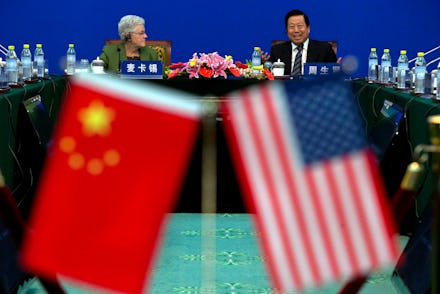This Study Shows What the Chinese Really Think Of America

The news: A new study shows that while Americans and the Chinese often distrust each other, they don't view each other as enemies.
The Carnegie Endowment for International Peace and the China Strategic Culture Promotion Association surveyed both the general public and elites from government, military, business, and academic sectors. They interviewed 1,004 Americans from the general public and 305 U.S. elites, and 2,597 average Chinese citizens and 358 elites. They found that just 15% of average Americans and 12% of everyday Chinese viewed the other nation as an enemy.
Just 2% of American elites viewed China as an enemy, and only 1% of those in business and trade held that viewpoint. But a much higher number of Chinese elites, 27%, described America as an enemy - buoyed by a high percentage of Chinese government officials who held that viewpoint.
Majorities described the other nation as a competitor, with just 16% of the American public and 13-22% of American elites describing China as a partner.
And we're concerned about different things:
"While a majority of the American public was more concerned about China’s economic strength (59%) than its military strength (28%), a plurality of the Chinese public (34%) was more concerned about U.S. military strength than U.S. economic strength (20%)."
Overall, though, Americans and the Chinese don't trust each other very much: Less than 40% of persons in all categories said the other country "can be trusted a great deal / fair amount," with both the Chinese public and elites overwhelmingly distrusting America.
Charts below, courtesy of the Carnegie Endowment:
The takeaway: The situation isn't ideal, but according to lead paper author Michael Swaine, "There is a strong recognition of need of the two countries to improve their relationship and to cooperate more deeply." He noted that 81-94% of U.S. government officials and media elites believed it was important to build a strong relationship with China, and that "[suggests] that there isn't a confirmation of the more extremist interpretations of the relationship that people often see in mass media or in other places."
The majorities of both countries believed that it was time for shared global leadership between the U.S. and China. Swaine said this indicated that many Chinese people recognized that their country was not yet ready for global leadership, but that when it is, "They see that sort of role not as one of benign leadership, but as one of lording it over other countries, and they don't want to see China doing that."